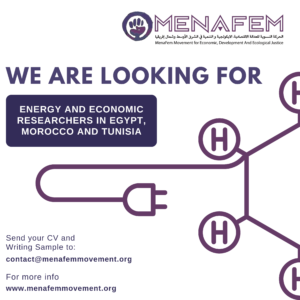
Terms of Reference:
MENA Fem Movement for Economic, Development, and Ecological Justice envisions a new global economic system based on intersectional feminist principles, human rights, and ecological justice driven by the needs of communities and the marginalized, in particular in the Middle East and North Africa (MENA) region and beyond.
Our mission is to confront poverty, deprivation, inequalities and lack of substantive democratic rights by empowering communities and vulnerable groups to resist all forms of injustices and inequalities. The network was established in 2023 and consists of local and regional organizations dedicated to achieving equitable development and fostering a just, ecologically, sustainable feminist economy. The movement targets influencing policies related to debt management, economic justice, and ecological justice. This involves organizing and mobilizing advocacy campaigns to effect policy change, producing alternative narratives, knowledge, and research, and challenging unjust economic systems.
Project Introduction:
As the world increasingly recognizes the urgent need to mitigate climate change and transition towards sustainable and just energy sources, it is imperative to analyze the implications of this transition through a holistic lens, considering its impact on social equity and environmental justice. The Global Gateway Investment package represents a new approach to financing renewable energy projects and increasing the share of hydrogen in energy mixes. However, does the Global Gateway and other financing mechanisms represent a real departure from the traditional neoliberal approach to energy financing? This project aims to deliver in-depth analysis addressing the energy transition and considerations of just transition in Morocco, Tunisia, and Egypt.
The Global Gateway and other financing mechanisms like the European Investment Bank’s Green Hydrogen Fund are branded as climate financing which contribute to mitigation, but whether or not they contribute to a just energy transition remains doubtful. These financing schemes do not include technology transfer, they are driven by large European corporations and often target countries that have been colonized. They prioritize private sector and profit-making policies; which often result in increased corruption, unjust distribution and worsening of compounded vulnerabilities of marginalized communities.
By producing evidence-based analysis with an anticolonial feminist lens, the project aims to contribute to informed decision-making among policymakers, stakeholders, and the public, ultimately fostering a more equitable and inclusive just transition process.This involves understanding their aspirations, concerns, and priorities regarding just energy access, affordability, and environmental sustainability.
Centering feminist perspectives and anti-colonial approaches as well as communities most affected by the transition will enable the development of policies ensuring the transition process is equitable, inclusive, and reflective of the needs and values of the people it aims to serve. Finally, the three in-depth analysis findings will be disseminated widely to policymakers, CSOs, researchers, and other stakeholders who can utilize them for advocacy and decision-making. By reaching these key actors, we aim to influence policy formulation, shape strategic initiatives, and catalyze action towards a more just and sustainable energy future for Morocco, Tunisia, Egypt.
Project and Research Locations:
Egypt, Morocco and Tunisia
Project Objectives:
- Providing critical insights into the implications of hydrogen transition for marginalized communities, ensuring their voices are heard in decision-making processes.
- Equipping grassroots organizations and community members with evidence-based knowledge to advocate for their rights and needs in the energy transition.
- Catalyzing policy changes and practices that prioritize equity, justice, and sustainability in the transition to green hydrogen energy, ultimately contributing to a more inclusive and just future for all.
Responsibilities of National Researcher:
- Participate in conceptual framing and methodology development workshop(s) online.
- Organize national consultations to engage various relevant national stakeholders and civil society/grassroots organizations and to identify key priorities at the national level.
- Collect primary data through surveys, interviews, focus groups and workshops.
- Analyze data to identify trends, challenges, and opportunities related to the green hydrogen transition.
- Develop a brief research proposal and outline for national in-depth analysis under the guidance of the MENA Fem team.
- Conduct comprehensive research on the socio-economic impacts of green hydrogen transition and employ principles of intersectionality and justice in analysis of collected data.
- Ensure clarity, coherence, and relevance of the content in alignment with project objectives and organizational principles.
- Draft and submit the national research paper in line with the conceptual framework and methodology.
- Incorporate feedback and refine the analytical papers in cooperation with the MENA Fem Team.
- Cooperate with MENA Fem on developing a dissemination plan to reach a wide audience, including policymakers, CSOs, researchers, and the general public.
Deliverables:
- Research Proposal
- Data sets and findings of consultations
- Final Research Paper
- Policy Brief based on findings
Qualifications and Experience:
The successful National Researcher should have:
- Advanced University Degree in Renewable Energy Studies, Social Sciences, Public Policy & Planning, Environmental Studies, Environmental Policy & Planning, and/or a related field
- Experience in research in renewable energy, just energy transition, and policy-making research on climate change issues
- Experience Partaking in stakeholder dialogues, policy discussions, and advocacy work
- Experience in gender equity considerations and feminist perspectives
- Knowledge and understanding of rights-based approaches
- Previous experience in grassroots research and fieldwork
- Excellent analytical skills and narrative building
- Ability to deliver timely results
- Priority will be given to researchers affiliated with an NGO or a CSO
- Excellent verbal and written communication skills in Arabic, English and/or French
Application Process:
Interested individuals should send their updated CVs and writing samples to [email protected] no later than August 25
Priority will be given to researchers affiliated with an NGO or a CSO.

